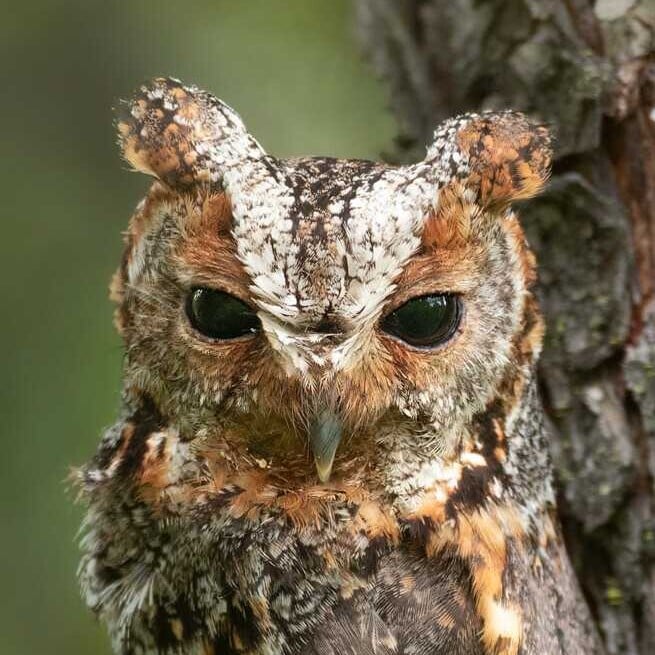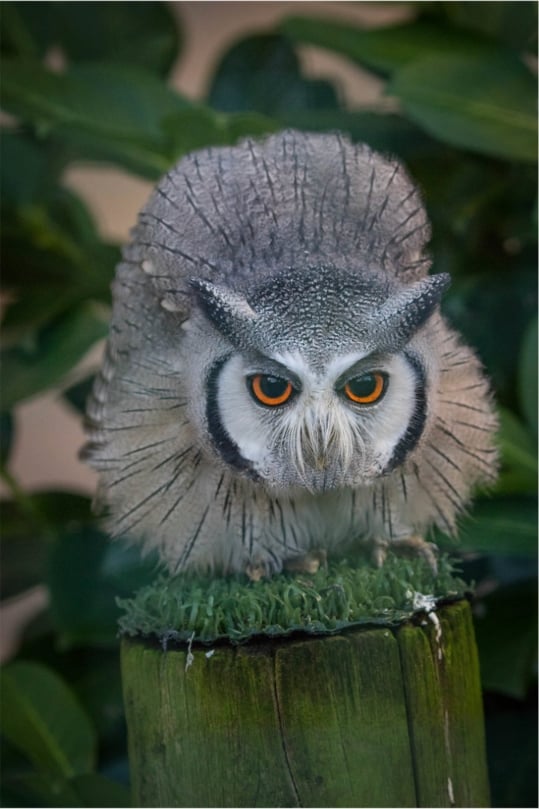From VINS
Recapture Alert! This Northern Saw-whet Owl was encountered by the VINS research team on October 17 at 10 PM. It was quickly discovered that this bird was already banded with band number 1124-47884. Our team recognized the number as one belonging to our friends up at North Branch Nature Center in Montpelier. A quick message confirmed that this bird was in fact one of theirs. The bird was originally banded at North Branch on October 11 at 8:40 PM. The bird weighed 92 grams and was recorded as a Second Year Female. By the time it made its way approximately 45 miles south, she weighed 81 grams.
Recaptures like this illustrate the importance of having multiple stations utilizing the standardized protocol of Project Owlnet. Each recapture provides important migration data and helps to better understand this secretive species.
This bird was handled for the purpose of scientific research under a federally authorized Bird Banding Permit issued by the U.S. Geological Survey and in accordance with all state permitting requirements


It is not the most pleasant way to get to do it, but handling samples is the only way I’ve gotten to actually touch owl parts. Though I did get to hold a live screech owl this year, you hardly feel anything due to them being so small and the heavy leather glove. I’ve learned so much by actually getting to touch the bones and feathers though. Reading about them is one thing, but handling them is quite eye opening. Very lucky to get your hands on the feather, but keep in mind it is technically illegal, and the penalty is something that is meant to deter traffickers, so it is pretty severe potentially. I’m not saying I wouldn’t have done the same if given the opportunity, just a heads up if you aren’t aware.
Handling feathers though really taught me about how they can fly so silently. Seeing the anti-turbulance fringed edge, the long length, but low barb density, the give of the barbs themselves. It feels and looks so different than almost any other bird. If you get your hands on any other feathers, even backyard birds, compare the 2 and pick out all the differences and it should be very informative.
Oh, shit. I had no idea.
Yes, it’s a violation of the Migratory Bird Treaty Act. It’s got some wild penalty of like $100,000 and jail time. In your case this seems excessive, and if for whatever mysterious reason you got “caught,” I imagine it would just get confiscated. It’s not intended to harass someone picking up a random feather, and I’m not aware of any time it has been used that way.
The simple reason for it, is that instead of the feds having to take every person with a bird part to court and prove guilt, this shifts the responsibility of proof to the feather holder.
Again, this may still sound very overkill. But this is who this law is for:
Man to plead guilty in ‘killing spree’ of eagles and other birds for feathers prized by tribes
The idea is to make it so nobody wants to do anything even questionable if they are killing endangered species for money. Even with this high penalty, there are still many reports of people breaking the law. So while your one feather is technically illegal, neither you nor the government want to waste each other’s time and money, so it serves as a deterrent to if someone offers you money for that feather and giving you or someone else the idea of going out and “finding a few more that were already dead when they got there.”
So I don’t want you to get paranoid or anything, I just want you to be informed. It’s a small momento of something you innocently experienced, and I would likely have done the same as you. Just keep it in mind with what company you share the story with, because while probably over 99% of stuff is acquired by random chance, a few motivated individuals can really hurt a local ecosystem, as predators reproduce in small numbers compared to most things.
If you decide to do more reading, check out how Native Americans aquire Eagle feathers. The bodies and fearhers have to all get DNA sequenced and cataloged with the federal government, and each feather has a serial number and chain of custody. Eagles are treated with the most seriousness! Even zoo/rescue eagles that die of natural causes have to be sent to DC. Amazing legal stuff!
I wrote all that and then noticed you are on the Canada instance!
The Treaty actually looks to have been made between England, on behalf of Canada, and the United States, so I’m not sure on the penalty side, but the possession is still illegal, and I also saw it stated you cannot dispose of a dead bird either, much like I said about the eagles. I guess that’s too close to disposing of potential evidence.
The Migratory Bird Treaty or Convention is an environmental treaty between Canada and the United States. It was originally signed on 16 August 1916 by the United States and the United Kingdom (representing Canada), entered into force on 6 December 1916 and has since been amended several times.
I greatly appreciate the information! Thank you.